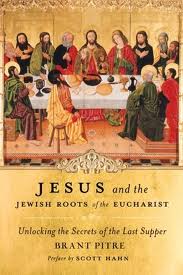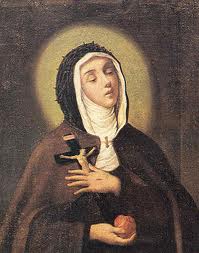The Seventh Thursday in Ordinary Time – from the Gospel of Mark the full reading and reflection
an excerpt from today’s reflection by Don Schwager: 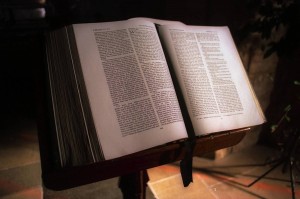
Was Jesus’ exaggerating when he urged his followers to use drastic measures to avoid evil and its harmful consequences? Jesus set before his disciples the one supreme goal in life that is worth any sacrifice, and that goal is God himself and his will for our lives which leads to everlasting peace and happiness. Just as a doctor might remove a limb or some part of the body in order to preserve the life of the whole body, so we must be ready to part with anything that causes us to sin and which leads to spiritual death. Jesus warns his disciples of the terrible responsibility that they must set no stumbling block in the way of another, that is, not give offense or bad example that might lead another to sin. The Greek word for temptation (scandalon) is exactly the same as the English word scandal. The original meaning of scandal is a trap or a stumbling block which causes one to trip and fall. The Jews held that it was an unforgivable sin to teach another to sin. If we teach another to sin, he in turn may teach still another, until a train of sin is set in motion with no foreseeable end. The young in faith are especially vulnerable to the bad example of those who should be passing on the faith. Do you set a good example for others to follow, especially the young?
What does Jesus mean when he says “have salt in yourselves”? Salt served a very useful purpose in hot climates before the invention of electricity and refrigeration. Salt not only gave food flavor, it also preserved meat from spoiling. Salt was used as a symbol of fellowship and the common meal. The n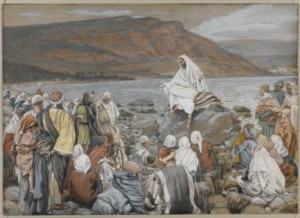 ear-Eastern expression to betray the salt meant to betray one’s Master or some person who was owed loyalty and devotion. Leonardo da Vinci in his painting of the Last Supper depicts Judas in the act of tipping over the salt shaker, thus symbolically indentifying himself as the betrayer of his Master. Jesus used the image of salt to describe how his disciples are to live in the world. As salt purifies, preserves, and penetrates, so the disciple must be as salt in the world of human society to purify, preserve, and penetrate that society for the kingdom of God and of his righteousness and peace. What did Jesus mean by the expression “salted with fire” and “salt becoming saltless”? Salt was often put in ovens to intensify the heat. When the salt was burned off and no longer useful it was thrown out on the road or on the roof top where it would easily get trodden upon. Perhaps Jesus wanted to contrast useful salt used for giving flavor and for preserving food with salt which was burned and no longer of much benefit, to encourage his disciples to be faithful witnesses and to not neglect the opportunity to influence others for the kingdom of God through the witness of their lives and their testimony to the power of the kingdom of God.
ear-Eastern expression to betray the salt meant to betray one’s Master or some person who was owed loyalty and devotion. Leonardo da Vinci in his painting of the Last Supper depicts Judas in the act of tipping over the salt shaker, thus symbolically indentifying himself as the betrayer of his Master. Jesus used the image of salt to describe how his disciples are to live in the world. As salt purifies, preserves, and penetrates, so the disciple must be as salt in the world of human society to purify, preserve, and penetrate that society for the kingdom of God and of his righteousness and peace. What did Jesus mean by the expression “salted with fire” and “salt becoming saltless”? Salt was often put in ovens to intensify the heat. When the salt was burned off and no longer useful it was thrown out on the road or on the roof top where it would easily get trodden upon. Perhaps Jesus wanted to contrast useful salt used for giving flavor and for preserving food with salt which was burned and no longer of much benefit, to encourage his disciples to be faithful witnesses and to not neglect the opportunity to influence others for the kingdom of God through the witness of their lives and their testimony to the power of the kingdom of God.
“Lord Jesus, fill me with your Holy Spirit that I may radiate the joy of the gospel to others. May your light and truth shine through me that others may find new life and freedom from sin and the corruption of evil.”
for the full reflection visit : Daily Reading and Meditation
Tags: catholic, catholic podcast, catholic prayer, cathollc spirituality, don schwager, gospel of mark, Jesus, Lord Jesus, stumbling block
This entry was posted on Thursday, February 24th, 2011 at 6:00 am
You can follow any responses to this entry through the RSS 2.0 feed.
Part 2…What a fantastic book, what a fantastic (and fun) interview with Dr. Brant Pitre, discussing “Jesus and the Jewish 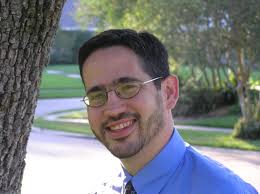 Roots of the Eucharist”. This book has what it takes to become a classic, similiar in importance as Dr. Scott Hahn’s “The Lamb’s Supper”!
Roots of the Eucharist”. This book has what it takes to become a classic, similiar in importance as Dr. Scott Hahn’s “The Lamb’s Supper”!
The description from the book says it best….“Jesus and the Jewish Roots of the Eucharist shines fresh light on the Last Supper by looking at it through Jewish eyes. Using his in-depth knowledge of the Bible and ancient Judaism, Dr. Brant Pitre answers questions such as: What was the Passover like at the time of Jesus? What were the Jewish hopes for the Messiah? What was Jesus’ purpose in instituting the Eucharist during the feast of Passover? And, most important of all, what did Jesus mean when he said, “This is my body… This is my bloodâ€?
To answer these questions, Pitre explores ancient Jewish beliefs about the Passover of the Messiah, the miraculous Manna from heaven, and the mysterious Bread of the Presence. As he shows, these three keys—the Passover, the Manna, and the Bread of the Presence—have the power to unlock the original meaning of the Eucharistic words of Jesus. Along the way, Pitre also explains how Jesus united the Last Supper to his death on Good Friday and his Resurrection on Easter Sunday.
Inspiring and informative, Jesus and the Jewish Roots of the Eucharist is a groundbreaking work that is sure to illuminate one of the greatest mysteries of the Christian faith: the mystery of Jesus’ presence in “the breaking of the bread.â€
[powerpress]
and be sure to check out Dr. Brant Pitre’s excellent website!
Tags: ancient judaism, brant pitre, catholic, catholic podcast, catholic prayer, cathollc spirituality, doubleday religion, eucharist, Jesus, mysteries, work
This entry was posted on Monday, February 14th, 2011 at 7:58 am
You can follow any responses to this entry through the RSS 2.0 feed.
What a fantastic book, what a fantastic (and fun) interview with Dr. Brant Pitre, discussing “Jesus and the Jewish  Roots of the Eucharist”. This book has what it takes to become a classic, similiar in importance as Dr. Scott Hahn’s “The Lamb’s Supper”!
Roots of the Eucharist”. This book has what it takes to become a classic, similiar in importance as Dr. Scott Hahn’s “The Lamb’s Supper”!
The description from the book says it best….“Jesus and the Jewish Roots of the Eucharist shines fresh light on the Last Supper by looking at it through Jewish eyes. Using his in-depth knowledge of the Bible and ancient Judaism, Dr. Brant Pitre answers questions such as: What was the Passover like at the time of Jesus? What were the Jewish hopes for the Messiah? What was Jesus’ purpose in instituting the Eucharist during the feast of Passover? And, most important of all, what did Jesus mean when he said, “This is my body… This is my bloodâ€?
To answer these questions, Pitre explores ancient Jewish beliefs about the Passover of the Messiah, the miraculous Manna from heaven, and the mysterious Bread of the Presence. As he shows, these three keys—the Passover, the Manna, and the Bread of the Presence—have the power to unlock the original meaning of the Eucharistic words of Jesus. Along the way, Pitre also explains how Jesus united the Last Supper to his death on Good Friday and his Resurrection on Easter Sunday.
Inspiring and informative, Jesus and the Jewish Roots of the Eucharist is a groundbreaking work that is sure to illuminate one of the greatest mysteries of the Christian faith: the mystery of Jesus’ presence in “the breaking of the bread.â€
and be sure to check out Dr. Brant Pitre’s excellent website!
Tags: brant pitre, catholic, catholic podcast, catholic prayer, cathollc spirituality, doubleday religion, feast of passover, Jesus, jewish roots, last supper, manna from heaven, mysteries, work
This entry was posted on Friday, February 11th, 2011 at 12:38 am
You can follow any responses to this entry through the RSS 2.0 feed.
The Third Monday in Ordinary Time – from the Gospel of Mark the full reading and reflection
“All sins will be forgiven except blasphemy against the Holy Spirit”
an excerpt from today’s reflection by Don Schwager: 
When danger lurks, what kind of protection do you seek? Jesus came to free us from the greatest danger of all – the corrupting force of evil which destroys us from within and makes us slaves to sin and Satan (John 8:34). Evil is not an impersonal force that just happens. It has a name and a face and it seeks to master every heart and soul on the face of the earth (1 Peter 5:8-9). Scripture identifies the Evil One by many names, ‘Satan’, ‘Be-el’zebul – the prince of demons’, the ‘Devil’, the ‘Deceiver’, the ‘Father of Lies’, and ‘Lucifier’, the fallen angel who broke rank with God and established his own army and kingdom in opposition to God. Jesus declared that he came to overthrow the power of Satan and his kingdom (John 12:31). Jesus’ numerous exorcisms brought freedom to many who were troubled and oppressed by the work of evil spirits. Jesus himself encountered personal opposition and battle with Satan when he was put to the test in the wilderness just before his public ministry (Matthew 4:1; Luke 4:1). He overcame the Evil One through his obedience to the will of his Father.
Some of the Jewish leaders reacted vehemently to Jesus’ healings and exorcisms and they opposed him with malicious slander. How could Jesus get the power and authority to release individuals from Satan’s influence and control? They assumed that he had to be in league with Satan. They attributed his power to Satan rather than to God. Jesus asserts that no kingdom divided against itself cannot survive for long. We have witnessed enough civil wars in our own time to prove the destructive force at work here for the annihilation of whole peoples and their land. If Satan lends his power against his own forces then he is finished. Cyril of Alexandria, a 5th century church father explains the force of Jesus’ argument:
Kingdoms are established by the fidelity of subjects and the obedience of those under the royal scepter. Houses are established when those who belong to them in no way whatsoever thwart one another but, on the contrary, agree in will and deed. I suppose it would establish the kingdom too of Beelzebub, had he determined to abstain from everything contrary to himself. How then does Satan cast out Satan? It follows then that devils do not depart from people on their own accord but retire unwillingly. “Satan,†he says, “does not fight with himself.†He does not rebuke his own servants. He does not permit himself to injure his own armorbearers. On the contrary, he helps his kingdom. “It remains for you to understand that I crush Satan by divine power.†[Commentary on Luke, Homily 80]
Jesus asserted his authority to cast out demons as a clear demonstration of the reign of God. God’s power is clearly at work in the exorcisms which Jesus performed and they give evidence that God’s kingdom has come.
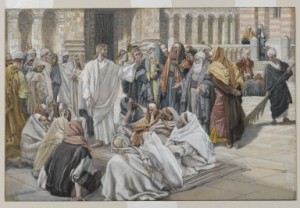 What kind of spiritual danger or harm should we avoid at all costs? Jesus used the illustration of a strong man whose house and possessions were kept secure. How could such a person be overtaken and robbed of his goods except by someone who is stronger than himself? Satan, who is our foe and the arch-enemy of God, is stronger than us. Unless we are clothed in God’s strength, we cannot withstand Satan with our own human strength. What does Satan wish to take from us – our faith and confidence in God and our allegiance to follow God’s law. Satan is a rebel and a liar. Satan can only have power or dominion over us if we listen to his lies and succumb to his will which is contrary to the will of God. Jesus makes it clear that there are no neutral parties in this world. We are either for Jesus or against him, for the kingdom of God or against it. There are two kingdoms in opposition to one another – the kingdom of God’s light and truth and the kingdom of darkness and deception under the rule of Satan. If we disobey God’s word, we open to door to the power of sin and Satan’s influence in our lives. If we want to live in true freedom from the power of sin and Satan, then our “house” – our mind and heart and whatever we allow to control our appetites and desires – must be occupied and ruled by Jesus Christ where he is enthroned as Lord and Savior. Do you know the peace and security of a life submitted to God and to his word?
What kind of spiritual danger or harm should we avoid at all costs? Jesus used the illustration of a strong man whose house and possessions were kept secure. How could such a person be overtaken and robbed of his goods except by someone who is stronger than himself? Satan, who is our foe and the arch-enemy of God, is stronger than us. Unless we are clothed in God’s strength, we cannot withstand Satan with our own human strength. What does Satan wish to take from us – our faith and confidence in God and our allegiance to follow God’s law. Satan is a rebel and a liar. Satan can only have power or dominion over us if we listen to his lies and succumb to his will which is contrary to the will of God. Jesus makes it clear that there are no neutral parties in this world. We are either for Jesus or against him, for the kingdom of God or against it. There are two kingdoms in opposition to one another – the kingdom of God’s light and truth and the kingdom of darkness and deception under the rule of Satan. If we disobey God’s word, we open to door to the power of sin and Satan’s influence in our lives. If we want to live in true freedom from the power of sin and Satan, then our “house” – our mind and heart and whatever we allow to control our appetites and desires – must be occupied and ruled by Jesus Christ where he is enthroned as Lord and Savior. Do you know the peace and security of a life submitted to God and to his word?
What is the basis of our hope and confidence in God? Through Jesus’ death on the cross and his victory over the grave when he rose again on the third day, Satan has been defeated and death has been overcome. We now share in Christ’s victory over sin and Satan and receive adoption as God’s sons and daughters. Through the gift of the Holy Spirit, the Lord enables us to live a new life of love and freedom from slavery to sin. The Lord Jesus is our refuge and strength because he makes his home with us (John 15:4) and gives us the power and help of the Holy Spirit. Do you take refuge in the Lord and allow him to be the Ruler of your life?
“Lord Jesus, you are my hope and salvation. Be the ruler of my heart and the master of my home. May there be nothing in my life that is not under your lordship.”
for the full reflection visit : Daily Reading and Meditation
Tags: blasphemy against the holy spirit, catholic, catholic podcast, catholic prayer, cathollc spirituality, cyril of alexandria, don schwager, evil spirits, gospel of mark, Jesus, jesus christ, Lord Jesus, prince of demons, public ministry, Satan cast out Satan
This entry was posted on Monday, January 24th, 2011 at 8:43 am
You can follow any responses to this entry through the RSS 2.0 feed.
“He was called Jesus”
an excerpt from today’s reflection by Don Schwager: 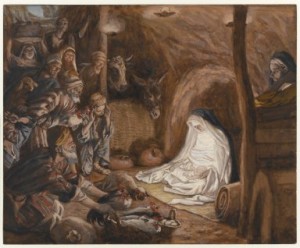
In fulfilment of this precept, Mary’s newborn child is given the name Jesus on the eighth day according to the Jewish custom. Joseph and Mary gave the name Jesus because that is the name given by God’s messenger before Jesus was conceived in Mary’s womb. This name signifies Jesus’ identity and his mission. The literal Hebrew means the Lord saves. Since God alone can forgive sins, it is God who, in Jesus his eternal Son made man will save his people from their sins (Matthew 1:21). In the birth and naming of this child we see the wondrous design and plan of God in giving us a Savior who would bring us grace, mercy, and freedom from the power of sin and the fear of death. The name Jesus signifies that the very name of God is present in the person of his Son who became man for our salvation. Peter the Apostle exclaimed that there is no other name under heaven given among mortals by which we must be saved (Acts 2:12). In the name of Jesus demons flee, cripples walk, the blind see, the deaf hear, and the dead are raised. His name is exalted far above every other name (Philippians 2:9-11). The name Jesus is at the heart of all Christian prayer. It is through and in Jesus that we pray to the Father in the power of the Holy Spirit. Many Christians have died with one word on the lips, the name of Jesus. Do you exalt the name of Jesus and pray with confidence in his name?
“Lord Jesus Christ, I exalt your name above every other name. For in you I have pardon, mercy, grace and victory over sin and death. You humbled yourself for my sake and for the sake of all sinners by sharing in our humanity and by dying on the cross. Help me to always praise your holy name and to live for your greater glory.”
for the full reflection visit : Daily Reading and Meditation
Tags: blessed virgin mary, catholic, catholic podcast, catholic prayer, cathollc spirituality, don schwager, gospel of luke, heaven, Jesus, joseph and mary, name of jesus, reflection, shepherds, solemnity of the blessed virgin mary
This entry was posted on Saturday, January 1st, 2011 at 12:05 am
You can follow any responses to this entry through the RSS 2.0 feed.
“In an instant, I saw five brilliant rays of light shine forth from his most holy wounds, and all came to my face.” St. Veronica Giuliani wrote these words more than three centuries ago, describing her mystical experience of Christ.
Vatican City, Dec 15, 2010 / 07:37 pm (vatican.va).-
Dear Brothers and Sisters,
Today I would like to present a mystic who did not live in the Middle Ages. She is St Veronica Giuliani, a Poor Clare Capuchin nun. The reason is that 27 December will be the 350th anniversary of her birth. Città di Castello, the place where she lived the longest and where she died, as well as Mercatello — her birthplace — and the Diocese of Urbino are celebrating this event with joy.
Indeed, Veronica was born on 27 December 1660 in Mercatello, in the Metauro Valley to Francesco Giuliani and Benedetta Mancini. She was the last of seven sisters, three of whom were to embrace the monastic life.
She was given the name “Orsola†[Ursula]. She was seven years old when her mother died and her father moved to Piacenza as customs superintendent of the Duchy of Parma. It was in this city that Ursula felt a growing desire to dedicate her life to Christ. The call to her became ever more pressing so that, when she was 17, she entered the strict cloister of the monastery of Capuchin Poor Clares in Città di Castello. She was to remain here for the rest of her life. Here she received the name of “Veronicaâ€, which means “true image†and she was in fact to become a true image of the Crucified Christ.
A year later she made her solemn religious profession and the process of configuration to Christ began for her, through much penance, great suffering, and several mystic experiences linked to the Passion of Jesus: being crowned with thorns, the mystical espousal, the wound in her heart and the stigmata.
In 1716, when she was 56, she became Abbess of the monastery. She was reconfirmed in this office until her death in 1727, after a very painful prolonged agony that lasted 33 days and culminated in a joy so profound that her last words were: “I have found Love, Love has let himself be seen! This is the cause of my suffering. Tell everyone about it, tell everyone!†(Summarium Beatificationis, 115-120).
On 9 July she left her earthly dwelling place for the encounter with God. She was 67 years old; 50 of those years she spent in the monastery of Città di Castello. She was canonized on May 26, 1893, by Pope Gregory XVI.
Veronica Giuliani wrote prolifically: letters, autobiographical reports, poems. However, the main source for reconstructing her thought is her Diary, which she began in 1693: about 22,000 handwritten pages that cover a span of 34 years of cloistered life.
Her writing flows spontaneously and continuously. There are no crossings-out, corrections or punctuation marks in it, nor was the material divided into chapters or parts according to a plan.
Veronica did not intend to compose a literary work; on the contrary, Fr Girolamo Bastianelli, a Filippini religious, in agreement with the diocesan Bishop Antonio Eustachi, obliged her to set down her experiences in writing.
St Veronica has a markedly Christological and spousal spirituality: She experienced being loved by Christ, her faithful and sincere Bridegroom, to whom she wished to respond with an ever more involved and passionate love. She interpreted everything in the key of love and this imbued her with deep serenity. She lived everything in union with Christ, for love of him, and with the joy of being able to demonstrate to him all the love of which a creature is capable.
The Christ to whom Veronica was profoundly united was the suffering Christ of the Passion, death and Resurrection; it was Jesus in the act of offering himself to the Father in order to save us.
Her intense and suffering love for the Church likewise stemmed from this experience, in its dual form of prayer and offering. The Saint lived in this perspective: she prayed, suffered and sought “holy povertyâ€, as one “dispossessed†and the loss of self (cf. ibid., III, 523), precisely in order to be like Christ who gave the whole of himself.
In every page of her writings Veronica commends someone to the Lord, reinforcing her prayers of intercession with the offering of herself in every form of suffering. Her heart dilated to embrace all “the needs of the Holy Churchâ€, living anxiously the desire for the salvation of “the whole world†(ibid., III-IV, passim).
Veronica cried: “O sinners… all men and all women, come to Jesus’ heart; come to be cleansed by his most precious blood…. He awaits you with open arms to embrace you†(ibid., II, 16-17).
Motivated by ardent love, she gave her sisters in the monastery attention, understanding and forgiveness. She offered her prayers and sacrifices for the Pope, for her Bishop, for priests and for all those in need, including the souls in Purgatory.
She summed up her contemplative mission in these words: “We cannot go about the world preaching to convert souls but are bound to pray ceaselessly for all those souls who are offending God… particularly with our sufferings, that is, with a principle of crucified life†(ibid., IV, 877). Our Saint conceived this mission as “being in the midst†of men and God, of sinners and the Crucified Christ.
Veronica lived profound participation in the suffering love of Jesus, certain that “to suffer with joy†is the “key to love†(cf. ibid., I, 299.417; III, 330.303.871; IV, 192). She emphasizes that Jesus suffers for humanity’s sins, but also for the suffering that his faithful servants would have to endure down the centuries, in the time of the Church, precisely because of their solid and consistent faith.
She wrote: “His Eternal Father made them see and feel the extent of all the suffering that his chosen ones would have to endure, the souls dearest to him, that is, those who would benefit from his Blood and from all his sufferings” (ibid., II, 170).
As the Apostle Paul says of himself: “Now I rejoice in my sufferings for your sake, and in my flesh I complete what is lacking in Christ’s afflictions for the sake of his Body, that is, the Church†(Col 1:24).
Veronica reached the point of asking Jesus to be crucified with him. “In an instantâ€, she wrote, “I saw five radiant rays issue from his most holy wounds; and they all shone on my face. And I saw these rays become, as it were, little tongues of fire. In four of them were the nails; and in one was the spear, as of gold, red hot and white hot: and it went straight through my heart, from one side to the other … and the nails pierced my hands and feet. I felt great pain but in this same pain I saw myself, I felt myself totally transformed into God†(Diary, I, 897).
The Saint was convinced that she was already participating in the Kingdom of God, but at the same time she invoked all the Saints of the Blessed Homeland to come to her aid on the earthly journey of her self-giving while she waited for eternal beatitude; this was her undying aspiration throughout her life (cf. ibid., II, 909; V, 246).
With regard to the preaching of that time which often focused on “saving one’s soul†in individual terms, Veronica shows a strong “sense of solidarityâ€, a sense of communion with all her brothers and sisters on their way towards Heaven and she lives, prays and suffers for all. The penultimate, earthly things, although appreciated in the Franciscan sense as gifts of the Creator, were always relative, altogether subordinate to “God’s taste†and under the sign of radical poverty.
In the communio sanctorum, she explains the gift of herself to the Church, as the relationship between the pilgrim Church and the heavenly Church. “All the Saintsâ€, she wrote, “are up there thanks to the merit and the Passion of Jesus; but they cooperated with all that the Lord did, so that their life was totally ordered … regulated by these same works (his)†(ibid., III, 203).
We find many biblical citations in Veronica’s writings, at times indirectly, but always precise. She shows familiarity with the Sacred Text, by which her spiritual experience was nourished. Furthermore, it should be pointed out that the intense moments of Veronica’s mystical experience are never separate from the salvific events celebrated in the Liturgy, where the proclamation of the Word of God and listening to it has a special place. Hence Sacred Scripture illumines, purifies and confirms Veronica’s experience, rendering it ecclesial. On the other hand, however, her experience itself, anchored in Sacred Scripture with uncommon intensity, guides one to a more profound and “spiritual†reading of the text itself, to enter into its hidden depths. Not only does she express herself with the words of Sacred Scripture but she also really lives by them, they take on life in her.
For example, our Saint often quotes the words of the Apostle Paul: “If God is for us, who is against us?†(Rom 8:31; cf. Diary, I, 714; II 116.1021; III, 48).
The assimilation of this Pauline text, her great trust and profound joy, becomes a fait accompliwithin her. “My soulâ€, she wrote, “was bound to the divine will and I was truly established and fixed for ever in the will of God. It seemed to me that I should never again have to be separated from this will of God and I came to myself with these precise words: nothing will be able to separate me from the will of God, neither anxieties, nor sorrows nor toil nor contempt nor temptation nor creatures nor demons nor darkness, not even death itself, because, in life and in death, I want all, and in all things, the will of God†(Diary, IV, 272). Thus we have the certainty that death is not the last word, we are fixed in God’s will, hence, truly, in eternal life.
In particular, Veronica proved a courageous witness of the beauty and power of Divine Love which attracted her, pervaded her and inflamed her. Crucified Love was impressed within her flesh as it was in that of St Francis of Assisi, with Jesus’ stigmata. “‘My Bride’, the Crucified Christ whispers to me, ‘the penance you do for those who suffer my disgrace is dear to me’…. Then detaching one of his arms from the Cross he made a sign to me to draw near to his side… and I found myself in the arms of the Crucified One. What I felt at that point I cannot describe: I should have liked to remain for ever in his most holy side†(ibid., I, 37).
This is also an image of her spiritual journey, of her interior life: to be in the embrace of the Crucified One and thus to remain in Christ’s love for others.
Veronica also experienced a relationship of profound intimacy with the Virgin Mary, attested by the words she heard Our Lady say one day, which she reports in her Diary: “I made you rest on my breast, you were united with my soul, and from it you were taken as in flight to God†(IV, 901).
St Veronica Giuliani invites us to develop, in our Christian life, our union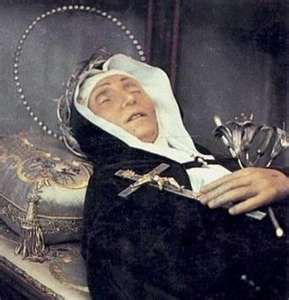 with the Lord in living for others, abandoning ourselves to his will with complete and total trust, and the union with the Church, the Bride of Christ.
with the Lord in living for others, abandoning ourselves to his will with complete and total trust, and the union with the Church, the Bride of Christ.
She invites us to participate in the suffering love of Jesus Crucified for the salvation of all sinners; she invites us to fix our gaze on Heaven, the destination of our earthly journey, where we shall live together with so many brothers and sisters the joy of full communion with God; she invites us to nourish ourselves daily with the Word of God, to warm our hearts and give our life direction. The Saint’s last words can be considered the synthesis of her passionate mystical experience: “I have found Love, Love has let himself be seen!â€. Thank you.
Tags: beauty, catholic, catholic podcast, catholic prayer, cathollc spirituality, christ in his suffering, Church, holy wounds, Jesus, mystic, mystic of the Church, mystical experiences, pope benedict, union with christ, veronica giuliani, witness
This entry was posted on Thursday, December 16th, 2010 at 6:03 am
You can follow any responses to this entry through the RSS 2.0 feed.

